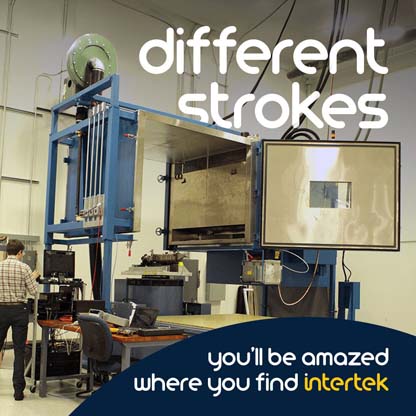Ensure the integrity of your automotive products using Vibration Analysis, Mechanical Shock and Vibration Testing provided by Intertek.
Vibration testing, vibration analysis and mechanical shock help attune automotive products for structural soundness and paramount vehicle perception using methods such as resonant searches and dwells, fixture resonance evaluation, custom fixture design and fabrication, reproduction of sample road and/or event data, shock response spectrum (SRS) testing, buzz, squeak, and rattle (BSR) testing and more.
Shaking Things Up with Vibration Testing Webinar | Top-11 FAQs of Vibration Testing
Our vibration testing labs across the U.S. — including Grand Rapids and Plymouth, Michigan; Cortland, New York; Lexington, Kentucky; and Boxborough, Massachusetts — come together to help Intertek offer automotive testing experience and expertise that is second to none. For example, electrodynamic (ED) shakers can be used for Accelerated Stress Testing (AST), Highly Accelerated Life Test (HALT) capabilities can be put into practice to arm products with ongoing reliability, and Failure Mode Verification Test (FMVT®) capabilities use an Intertek-patented resonance impact vibration pod in applications to uncover real-world failure modes to assist with reliability growth.
Additional capabilities include shock testing, vibration analysis, simulate environment chambers, data acquisition, custom test fixture controls and software, and more, helping you fill all your automotive testing and standard certification needs at one stop — Intertek.
These Are Some of The Standards We Test To:
- MIL-STD-810
- USCAR-2
- IEC 60068-2-6
- IEC 60068-2-64
- IEC 60068-2-27
- DC-10611
- CS.00054
- WDS-00.00EA-D11 Section 4.6.1, FMVT
- ABNT NBR 15940
- ABNT NBR 15941
- PF 90010
- VDA AK 1.4.2
- UN 38.3
- SAE J1455
- ISO 16750-3
- LV 124
- VW80000
- GS 9503
- GMW 3172
- GMW 3431
- GMW 8287
- GMW 15570
- GMW 3191
- GM 9123P
- Ford CETP 00.00-L-412
- Ford WCR 00.00EA-D11
- Chrysler PF-8982
- Toyota TSC7000G
- Nissan Design Specification 25100NDS00 [11]
- Hyundai/Kia Motor ES95400-10
- And many more please contact us for details
Tests We Offer:
Vibration Testing Capabilities
- Vibration types: Sine, random, sine on random, sine on sine, random on random and field data replication
- Combined vibration and environmental
- Electrodynamic (ED) shakers can be used for Accelerated Stress Testing (AST)
- Failure Mode Verification Testing (FMVT), Key Life Testing
- Payload: Up to 10,000 lbs.
- Velocity: Up to 80 in/s
- Shaker type: Electrodynamic (ED)
- Axis: Single axis can perform horizontal and vertical (X, Y and Z) axes independently.
| Shakers | Thermal Chamber | ||||||
| Vibe Force Rating (Sine/ Random) (lbs.) | Shock Force Rating (lbs.) | Displacement (inches) | Armature Bolt Pattern Size (inches) | Slip Table (dimensions in inches) | Humidity | Volume (cubic feet) |
Dimensions (L x W x H, inches) |
| 55000 / 50000 | 155000 | 3 | 24 | YES (96 x 72) | N/A | N/A | N/A |
| 28100 | 56200 | 4 | 20 | YES (48 x 48) | Yes | 216 | 72 x 72 x 72 |
| 25000 / 23000 | 58000 | 3 | 16 | YES (72 x 72) | Yes | 233 | 78 x 86 x 60 |
| 15400 | 30800 | 3 | 16 | YES (48 x 48) | Yes | 216 | 72 x 72 x 72 |
| 12000 | 12000 | 1 | 16 | YES (48 x 48) | No | 108 | 72 x 54 x 48 |
| 11023 | 22000 | 2 | 16 | YES (36 x 36) | N/A | N/A | N/A |
| 10000 | 13950 | 2 | 24 | None | No | 216 | 66 x 84 x 61 |
| 8000 | 21000 | 3 | 16 | YES (36 x 36) | No | 108 | 72 x 54 x 48 |
| 6000 / 5200 | 6000 | 1 | 12 | YES (30 x 30) | N/A | N/A | N/A |
| 6000 | 9750 | 2 | 12 | YES (30 x 30) | Yes | 61 | 54 x 54 x 36 |
| 4500 | 8070 | 2 | 12 | YES (30 x 30) | Yes | 48 | 40 x 57 x 36 |
| 4000 / 3300 | 4000 | 1 | 8 | YES (24 X 24) | N/A | N/A | N/A |
Vibration Analysis
- Fixture and Sample resonance evaluations
- Transmissibility
- Failure Mode Verification Testing (FMVT), Key Life Testing
Mechanical Shock Capabilities
- Shaker type: Electrodynamic (ED)
- Pulse type: Half sine, Sawtooth (Initial Peak and Terminal Peak), Triangle, Trapezoid, Square, Haversine and Full Sine.
- Axis: Single axis can perform horizontal and vertical (X, Y and Z) axes independently.
- Shock response spectrum (SRS) testing
- Stroke: Up to 4” pk-pk
- Velocity: Up to 180 in/s
- Payload: Up to 10000lbs
- Force lb. rating: 155,000
Drop Shock Capabilities
- Axis: Single, up and down.
- Shock type: Half sine
- Acceleration: Up to 1000G
- Duration: 1ms to 16ms
- Payload: Up to 1000lbs
Shaker Table Mounting Pattern
- Vibration adapter plates utilize 1/2”-13 holes on 4” centers
- Plate sizes range from 12” x 12” up to 72” x 72”.
Vibration Fixturing
Design:
- Custom test fixture design, CAD/CATIA Design
- Shop Engineering Design Built to Suit
- Accept client data in native IGS or STP formats.
- Finite Element Analysis (FEA) as required
Fabrication:
- Custom test fixture fabrication
- 3 Proto-Trak CNC Vertical Mil with travel up to 30” x 11” x 20”
- 2 CNC Machining Centers with travel up to 60” x 30” x 25”
- Jig Grinder with travel up to 24” X 11” x 12”
- Manual Lathe
- Welding aluminum, steel, MIG, TIG
- Easy access to laser, water jet, wire EDM cutting and powder coat painting
Types of Fixtures
- Vibration Testing
- Holding Fixtures
- Life Cycle Testing Fixture
- Photometry Fixture
- Mechanical Durability Fixture
Highly Accelerated Life Test (HALT) Capabilities
- Ramp/soak programmable
- Table: Up to 4' x 4' surface
- Height: Up to 35"
- Temperature range: -80°C to 180°C typical, -100°C to 200°C intermittent
- Thermal ramp rate: Up to 50°C/minute
- Vibration type: Pneumatic air hammer quasi-random 6-axis
- Acceleration: 50G's rms below 3kHz, 70G's rms below 10kHz
- Frequency range: 100 - 10,000Hz
Failure Mode Verification Test (FMVT®) Capabilities
- FMVT® is a process that can be performed in many ways, frequently using an Intertek patented resonance impact vibration pod in applications to uncover real world failure modes to assist with reliability growth.
- Ramp/soak programmable
- Six axis FMVT vibration pod
- Chamber dimensions: 71" x 54" x 47" high
- Temperature range: -80°C to 180°C typical
- Thermal ramp rate: Up to 30°C/minute
- Acceleration: 50Gpk
- Frequency range: 1 - 10,000Hz


